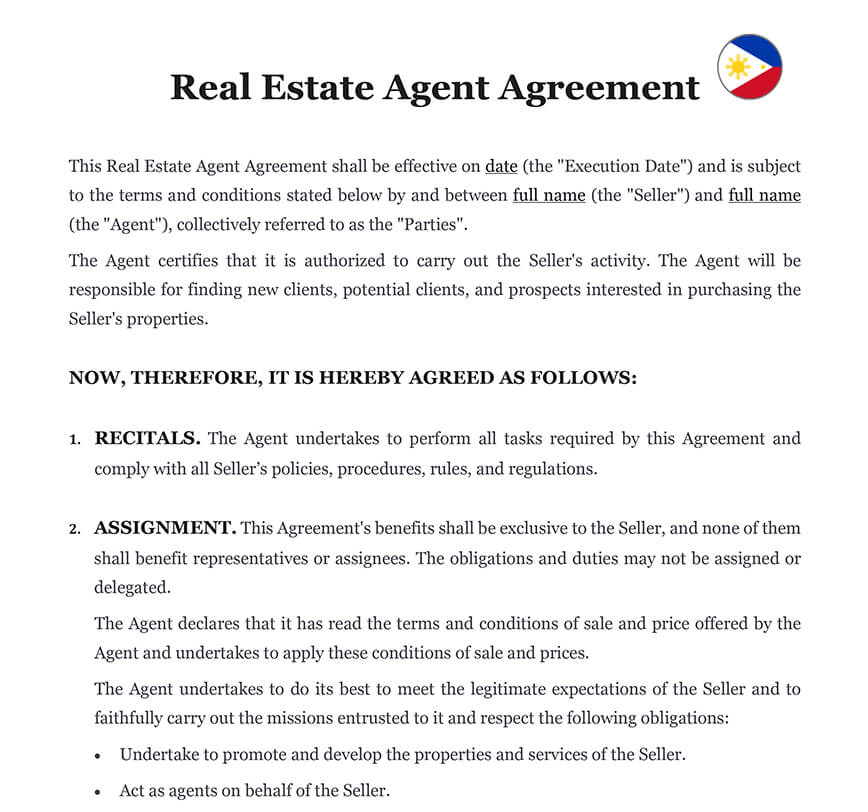The RESA Law defines five sorts of professionals who are deemed to be in the practice of real estate services in Section 3(g). They work as appraisers, assessors, brokers, and salespeople in the real estate industry. The first must be PRC-registered and licensed, whereas real estate salespeople just need to be certified.
Real Estate Agent, according to RA 9646, are individuals who provide professional advise and judgment on the purchase, enhancement, preservation, usage, or dispose of lands or improvements thereon. They also make real estate project conceptualization, planning, administration, and development easier.
Real estate appraisers provide services that include estimating and expressing an opinion on the worth of a property. Real estate assessors, on the other hand, are those who work for local government entities (cities, municipalities, and provinces) to appraise and value real properties such as plants, equipment, and machinery. Assessors undertake such activities for the purpose of taxing, whereas appraisers conduct such tasks for the purpose of reporting the values as appraised.
Real estate brokers operate as agents for one or more parties in a real estate transaction. They enable the offer, advertisement, solicitation, listing, promotion, mediation, negotiation, or actual meeting of minds between parties involved in a real estate sale, exchange, mortgage, lease, joint venture, or other comparable transaction. In a nutshell, they operate as a go-between for the individual who wants to sell their property and the one who wants to buy it.
Finally, real estate salespersons are individuals who may operate on behalf of a real estate broker in order to effectuate a real estate transaction. It is not unusual in the Philippines for a single real estate broker to supervise multiple salespeople.
All candidates must be Filipino nationals, albeit the law makes no distinction between natural-born and naturalized Filipino citizens in this situation. They must also have a college degree (or at least two years of college education for salespeople) and have never been convicted of a crime.
In addition to the standards listed above, consultants must demonstrate proof of expertise in the industry, such as documentation of being licensed for at least 10 years as a broker, assessor, bank or institutional appraiser, property-evaluating employee, or professional appraiser.
Corporations and partnerships may also practice real estate provided they are properly registered with the Securities and Exchange Commission. However, the executives or individuals allowed to operate on behalf of a corporation/partnership must all be licensed real estate brokers, appraisers, or consultants.
Each client’s expectations of their relationship with a real estate agent may differ. As a result, the contractual connection and one’s duties can be modified through a range of agreements adapted to the client’s study.
Clients who do not want to be committed exclusively to their real estate agent might enter into a “open” contract, which allows the seller or buyer to join into other contracts with other real estate brokers. The customer is only required to pay the commission to the agent who was successful in closing the relevant transaction in this circumstance.
An exclusive agreement, on the other hand, gives the contractual agency the only right to sell a property. He is the sole agent capable of carrying out the activities necessary to ensure the success of the intended transaction. As long as the contract is legitimate, the agent will earn his fee even if he is not present at the time of the sale.
In general, no. However, there is an exception in the law: foreign reciprocity. Section 24 of RA 9646 states that foreigners are not permitted to practice real estate services in the Philippines, but it also states that this rule does not apply if the country where the foreign applicant is from allows Filipinos in the real estate service industry to practice on its territory in the same way that its own citizens do.
Breach of such an agreement might take numerous forms. The client’s culpability may stem from his failure to honor the agent’s commission within the agreed-upon deadline or to pay it in full.
In the case of an exclusive contract negotiated with an agent, the client’s employment of another professional may be described as a breach of the terms of the agreement. A breach of agreement may arise on the real estate agent’s side if the agent fails to take all reasonable steps to complete his or her goal. On this basis, the client may be able to claim financial compensation for the loss incurred. The amount of compensation will be determined by the contract conditions and the market worth of the property.
In tort, real estate agent fraud occurs when an agent withholds crucial information regarding a property or provides incorrect information in order to deceive the customer. It is a fraud, for example, for a real estate agent who has been instructed by his client to search for a property of a specified size to manipulate the paperwork on a property in order to make it conform to the customer’s expectations, when it does not.
Section 39 states that any infringement of the RESA Law, including violations of its Implementing Rules and Regulations, would result in a fine of at least Php100,000 or imprisonment for at least two years, or both. If the criminal is not licensed, the punishment is twice (Php200,000 and/or 4 years’ imprisonment).
Furthermore, partnerships, companies, organizations, or other judicial entities that have committed, agreed to, or knowingly condoned such a breach are considered principals or co-principals of the offense, and are subject to the same punishment as the other participants.





